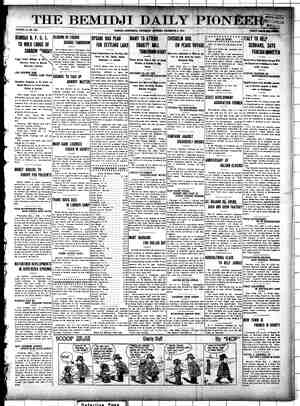The Nonpartisan Leader Newspaper, December 2, 1915, Page 7
You have reached the hourly page view limit. Unlock higher limit to our entire archive!
Subscribers enjoy higher page view limit, downloads, and exclusive features.
THE NONPARTISAN.LEADER PAGE SEVEN A Couple of Good Fellows L = ARE GOING “FELLOWS t~'I"I"II_VI' ARE GOOD TO THEMSELVES ERE are two“of the farmer’s greatest enemies. Nct because they are intrinsicly mean but because they are The better they are to ..’t,heinselves the meaner they are to the - farmer. : oy r The grain combine handles all the farmer’s grain. He pays the farmer just -about.what he pleases. He then sells it to the consumer—part of it-coming ‘back-to the farmer, who is also a consumer, at just about the price he pleases. e Then there is his boon-cempanion; pal and chum, the pack- ing combine. This fellow handles all' the stock, poultry, eggs and dairy products of the farmer. He determines the price he will ‘pay to the farmer. When he gets it he places it in cold storage and lets it out to the consumer a little at a time as an excuse. to keep the price.up. .. Often the farmer who produced the raw materials in which the: packing-eombines deals, buys back from -the“packing - combine - the finished - product-——at.the price determined by the combine. . - Any-attempt-or effort upon-the: part-of the farmer to pro- tect himself from these fellows, is very displeasing to these big fellows. - They know the farmer has the power to put them out of commission—if he ‘will only use that power. They know the farmer-can put them on the hummer any time he gets ready. That’s the-reason they support so many politicians and news- ~Dismissing- the first as a matter for. business men to prove and demonstrate to the farmer - themselves we pass to numher two. : ‘ < . ~Catalog heuses would. never get a cent’s worth of business from the farmer if they did not advertise. They advertise ex- tensively, industriously. and .incessantly. . .They “go after busi- ness;”” and getit. The:“local” ‘business man:expects it to coma to him, as a matter of course—and it does not. - The “live” ones are learning this. The others are dead, or dying. Coupled closely with this is number three. Local business men, as a rule, take the side of every ex- ploiting agency in the country against the farmer. Yhey line up with the grain combine, with the railroads, with the banks, with the elevator gang and in many cases openly oppose and are bitterly hostile to any cooperative move upon the part of the farmer to free himself from such exploitation. If the “local” business man is to have the hearty coopera- tion of the farmer he must get on common grounds with him. HARD LUCK,BILL,THOSE 7~ v NORTH DAKOTA RUBES R\ CO-OPERATIVE PACKING ' PLANT , good—good to-themselves. -They are so good to them- -selves that théy-are-obliged to-be mean to the farmer. TO HAVE A Too! papers to tell the farmers they can’t stick together and that co-' operation is a failure and that these big, fine fellows are the . farmer’s best friends. _That’s the reason they spend millions of dollars in polities. - If they can elect their own men to make laws they are sure not to get laws that will benefit the farmer. That’s also the reason they spend.large quantities of money to support big lobbys, to influence such lawmakers as are not. fully in sympathy with the .interest of these big fellows. They find that it pays to get right into politics up to their necks, pockethook and all. Knowing that it pays them to get into politics they cause the politicians, the alleged farm papers. and the rest of their servants to.advise the farmer to stay.out of politics—except on election day. On election day they expect : him to take the tip given out by the banker or-the broker and vote for some “friend” who-is just dying to serve the dear people. . » Look at the cartoon on this page and you will see how those. fellows look when they get the news-over ithe ticker, that the. farmer is-going to start some new cooperative enterprise. They dan’t like it a bit. But they are not.going to surrender - as easily as they appear to in this picture. . They are going to fight like grim death. They will cause you farmers and your organization to be misrepresented... Their papers will call you: “rubes” and “suckers.” They will call your organizers “grafters” and the whole effort you put forth a “skin game.” If you believe it that tickles them. . If you refuse to believe it they get down " in the mouth and grow huffy. They are good to you, of course, but better to themselves. He must sympéthize with him in his fights for better marketing, conditions, cleaner politics-and a more just treatment. ' * The “local” business man who sets his face against eve?m farmer’s move that starts is surely digging his own oconomic. . grave. And justly so. y The farmer can live witihout the “local” business man. The .great corporations, the railroads-and the grain speculator can live without the little business man. But the little business man cannot exist, as such without the farmer. As to how long the little business man lasts depends upon: how close he sticks to the farmer. . He must cater to the farmer. He must cultivate an actual friendly and social relation with the farmer. If he does not the farmer will “cut him out”. With modern and rapid transportation .and delivery\c‘onveniences thisi is possible. A : Without the farmer the little business man is done for. . If the little business man does not change his attitude towards the farmer he will lose him and lose him for good. ; > ’ % | % § f_jfir §






